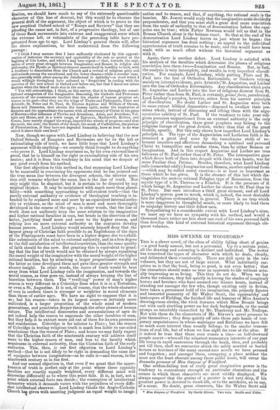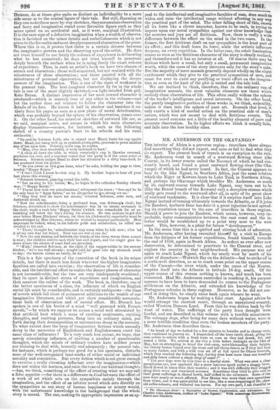MISS GWYNNE OF 'WOODFORD.*
THIS is a clever novel, of the class of ability falling short of genius —a good hardy annual, but not a perennial. Up to a certain point, all the drawing and colouring is distinct and individual. The writer has conceived the types of character with which lie deals, clearly, and delineated them consistently. There are dull spots in the two volumes, but they are not of large extent. What indistinctly sur- prises us is that the book, being so good, is not even better ; that the characters should make so near an approach to life without actu- ally impressing us as living. This they do not do. When we lay down the volumes, they fall quietly in among the shades of imaginary heroes and heroines who have amused our leisure hours, instead of standing out amongst the few who, though existing only in fiction, have taken a permanent hold of the imagination, the princely figures and immortal peasantry of Sir Walter Scott, the squirearchy and innkeepers of Fielding, the finished life and humour of Miss Austen's drawing-room circles, the vivid features which Miss Brontë brings out with such startling power on her dark backgrounds, or the social ,a.roups so inimitably enamelled by Mr. Thackeray and Mr. Trollope. Not with these do the characters of Mr. Riv era's novel presume to join themselves ; they drop quietly off into those pale bands of tem- porary acquaintances in whose marriages and flirtations we have felt so much more interest than usually belongs to the similar transac- tions of real life, but of whom we lose sight for ever at the altar. If it indeed be true that there ever comes a time—as half-drowned people assert—when all the minutest momentary interests of our past life troop in rapid succession through the brain, then, and probably not till then, shall we encounter afresh the safely married or buried heroes or heroines of the many second-rate novels we have perused and forgotten ; and amongst them, occupying a place neither the most nor the least obscure among those pallid hosts, will occur the dramatis persona of Miss Gsaynne of Woodford. One seldom-failing test of really great imaginative power is the tendency to concentrate strength on particular characters and the scenes in which those characters are most vividly displayed. We always suspect that the genius of a painter is not very deep, if his greatest power is devoted to dumb life, or to the accidents, so to say, of a scene. No doubt, great observers, like Sir Walter Scott and
• Miss Marine of Wooiiford. By Garth Rivers. Two vols. Smith and Elder.
-Dickens, do at times give quite as distinct an individuality to a mere side scene as to the central figure of their tale. But still, charming as they can makethese mere by-way sketches, they accumulate observation and fancy and imagination round some favourite figure such as they never spend on an accidental and, as it were, marginal illustration. It is the sure sign of a defective imagination when a wealth of observa- tion is lavished on the minor details and embellishments which is not given to the favourite andmost deeplyconcerned characters of the piece. Where this is so, it proves that there is a certain divorce between the imaginative powers and the observing eye of the artist. He does not trust himself to use freely the colours of experience in delineating what he has conceived ; he does not trust himself to penetrate deeply beneath the surface when he is using freely the exact colours of experience. Thus, in such an artist's book we have two classes of scenes and characters : those well-conceived, but not realized with the minuteness of close observation ; and those painted with all the minuteness of personal observation, but not displaying the deeper powers of the imagination. This is one of the signs ot weakness iin the present tale. The best-imagined character by far in the whole tale is one of the most slightly sketched,—a light-minded Irish girl, Rate Bryan. A distinct impression of her most inward character is produced—which is scarcely true of any other in the volume—and yet the author does not venture to follow the character into the details of its fate. He leaves it half in shadow and banishes it en- tirely from his pages as soon as a new phase of moral deterioration, which was probably beyond the sphere of his observation, comes over it. Oh the other hand, his mimitcst sketches of outward life are, as we said, marginal notes, not scenes in which his main characters display themselves—scenes, for instance, such as the following sketch of a country parson's feast to his schools and his rural orchestra :
"By-and-by Solomon Lobb, who is seated next Maud, turns his cup upside down. Maud, not being well up in symbolical etiquette, proceeds to press another cup of tea upon him. Pointing to his oup, he replies, " 'Miss, o'ive done wonderful, of reels incloined to bust.'
"A clink all down the table in which everybody's cup is likewise reversed, proclaims tea over, and a murmur round that the party is of the same mind as Solomon. Solomon nudges Maud to draw her attention to a dirty tune-book he has produced from his pocket. " • Be you aweer on this gran dune, miss?' he asks, holding the page to view, headed "Happy Saints." " I don't think I know it—but sing it. My brother hopes to hear all your best pieces this evening.'
"Solomon hemmed, glancing round the table.
" ' Let us zing to the braize,' 8x., he began in the orthodox Sunday church way, " Happy Saints." ' " Theezt best wait vor schoolmaister,' whispered the tenor; 'thee and he be the only bate in " Appy Saints," an we altogether be doo strong vor un.' " Sing thoy bert an leave me alooao,' retorted Solomon, sotto voce, and forthwith struck up. "Now the schoolmaster, being a profound bass, was Solomon's rival; but Solomon, determined to show the schoolmaster was by no means necessary in the choir, made a rush into Happy Saints' (which was remarkable for an as- tonishing roll below the line) during his absence. He was anxious to get this over before Moses Hitchens' return, for then his (Solomon's) superiority must be acknowledged by Miss Gwynne, whom he wished to impress particularly. Most important be looked, when, to his infinite pride and satisfaction, he rolled un- rivalled to the end.
" There,' thought he, sehoolmaister may coom when ho loik now; o'ive 'ad it all my own way vor wunst. They can see wot of can do.' " Now the sun shining red between the trunks of the trees, warns them sunset is near; the children receive each their bun and depart, and the singer goes in- doors where the odours of roast beef are prevalent. " 'Waly,' observed Solomon, at the sight of the supper-tables in the rectory kitchen, we're too wall already ; nought said ha' gone into my stomach avoor to-day: the barson dreats us rarely, he do.' "
This is a fair specimen of the execution of the book in its minor details, but there is much less finish wherever the higher imaginative faculties are called into exercise ; the observation of life is consider- able, and the intellectual effort to realize the deeper phases of character is not inconsiderable, but the two are very inadequately combined ; they lie apart in distinct strata of experience and imagination, and thus measure the calibre of the work. The book is, therefore, one of the better specimens of a class, the influence of which on English social life must be considerable, and is certainly ambiguous—the class of novels which fall short of permanent additions to the wealth of our imaginative literature, and which yet show considerable accumula- tions both of observation and of mental effort. Mr. Disraeli has spoken in one of his books of a mind "well gummed with French novels,"—by which we suppose lie means a mind well stimulated by that artificial heat which a mass of exciting sentiments, exciting thoughts, and exciting pictures, flung into an ordinary mind, pat forth during their decomposition or unconscious decay in the memory. To what extent does the heap of imaginative fictions which annually decay in the memories of Englishmen and Englishwomen exert the same class of influences ? To a very much less extent, we hope, that nerdy stimulating influence, of exciting a number of questionable thoughts, which the minds of ordinary readers have neither power nor training to deal with, honestly and adequately ; the present tale, for instance, which is perhaps too good for a fair specimen, disturbs none of the well-recognized land-marks of either social or individual morality and conviction. But every fiction which is not great enough to exercise a really elevating influence over the imagination—which does not widen the horizon, and raise the tone of our habitual thoughts —has, we think, something of the effect of creating what we may call a false appetite :—for there is a difference in kind between the effect of a work of art which acts on the sympathies mainly through the Imagination, and the effect of an inferior novel which acts directly on the sympathies as any story of human happiness or misery would, with the unfortunate knowledge in the background that the whole story is unreal. The one, making its appropriate impression as an ap- peal to the intellectual and imaginative faculties of man, does much to widen and raise the intellectual range without affecting in any way the practical part of the mind. The other fal 0. short of this, exerts all its force like a clever impostor, known to such, in trying to impose upon our moral sympathies against our clear knowledge that the sorrows and joys are all fictitious. Now, there is really a wide difference between the effect on the mind in the two cases. In the former, the first fictitious draft on our sympathies is the least part of its effect; and this draft loses its force, while the artistic influence deepens, on every repetition. In the latter case, the whole fascination ceases so soon as the fictitious character of the story is clearly realized, and thenceforward it has no interest at all. Of course there may be fictions which have a small, but only a small, permanent imaginative worth, while the mass of the story interests only for the story's sake. But the majority of mere anneals generally depend wholly on the slight excitement which they give to the practical sympathies of men, and cease for ever to exert any purifying or tonic effect on the imagina- tion so soon as the knot of the plot is untied and the. tale told.
We are inclined to think, therefore, that in the ordinary run of imaginative annuals, the most valuable elements are those which embody close observation of life. This often really widens the sphere of the reader's intelligence and moral interests. On the other hand, the purely imaginative portion of these works is, we think, unhealthy, unless it rises into the sphere of pure art. Beneath that level, it only exerts a kind of morbid action on the practical side of man's nature, which was not meant to deal with fictitious events. The present novel contains not a little of the healthy element of pure and accurate observation. In its higher efforts we think it usually fails, and falls into the less healthy class.































 Previous page
Previous page